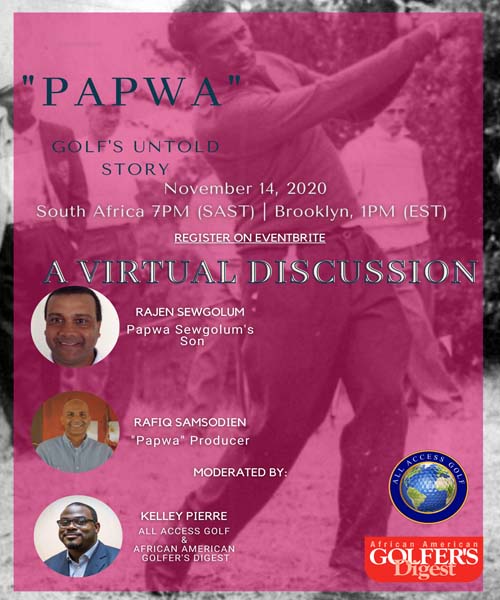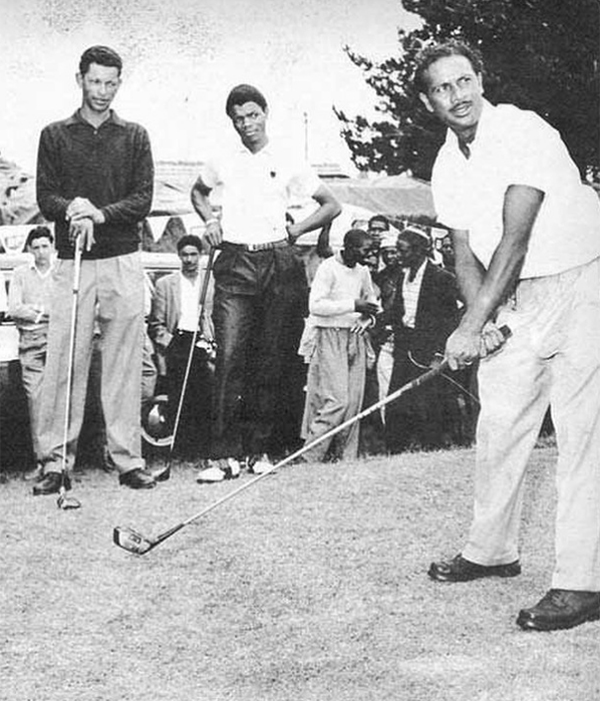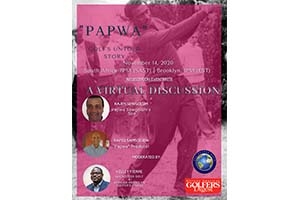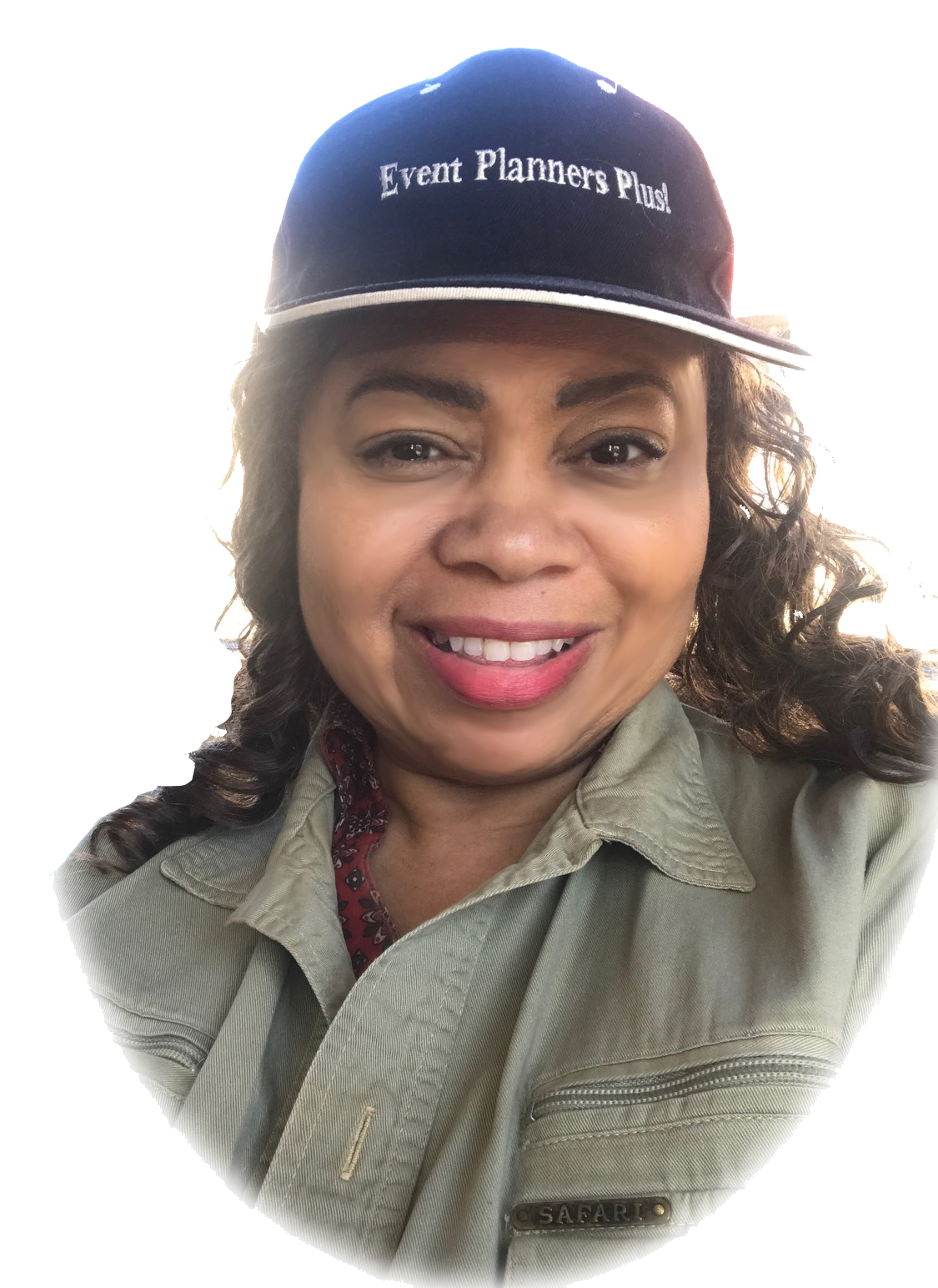
October 21, 2020 | BY AAGD STAFF
No history of non-white golf in South Africa would be complete without at least discussing Papwa Sewgolum. According to the South African Golf Association, much has been written about him in recent years and the general details of his life and career are well documented and well known. Nevertheless telling his story yet again in this history would not be out of place and might even throw up some hitherto unknown facet of his amazing life. Register below to attend this virtual discussion.
The history of Papwa’s achievements on the golf courses of the world are as exciting as his private and family life. It is to hear from his family and friends on the accomplishments he achieved and the difference his acts of battling racism in golf made on the game. This important discussion will reveal truisms and facts noteworthy for documenting his vital history.
The First Beginnings
Sewsunker Sewgolum, or Papwa as he was called meaning ‘small child’, was born in Durban to a blind mother in 1930. The family had very little money and it was a constant struggle to make ends meet. Papwa went to the Kulmareddy Indian School until Standard 2 but his father died when he was 13 years old and, left with the responsibility of looking after his mother and younger brother, he had to leave school and find work, according to SouthAfricanGolfAssociation.org.
He started caddying at the Beachwood Golf Club and, as it happened, continued to do so for 14 years. In his younger days there were times when he brought home as little as 7/6d (75c) per week and the family often went hungry. But he was becoming involved with and more and more interested in the game of golf. He practiced when he could, improving his skills, and started to enter for minor local tournaments. He was soon winning. The first time he did so his prize was a crate of cold drinks.
 YOU MAY ALSO LIKE: Celebrating Nelson Mandela International Day
YOU MAY ALSO LIKE: Celebrating Nelson Mandela International Day
Papwa had an obvious and natural talent for the game and this did not go unnoticed. Graeme Wulff, a member of Beachwood, recognized this talent and took him under his wing, giving him a permanent job in his cosmetics business. This was in 1957 when Papwa, now 27 years old, was no longer a youngster. He had already shown his potential by winning the Natal Non-European Open more than once. He was also married with a growing family to look after. In the face of apartheid in sport in South Africa Wulff was anxious to launch Papwa on the international scene and in 1958 applied for Papwa to play in Australia. The Australian authorities would not allow it. “The Australian colour bar is as effective as ours”, said Wulff with some bitterness.
Papwa Campaigning Abroad
Papwa’s first real break came in 1959 when his entry for the Open Championship to be played at Muirfield was accepted. He couldn’t sign his name on the entry form and was taught by Wulff with some difficulty how to do so, but he had arrived on the international stage, reverse grip and all, and from then on would never look back. His scores in the Open under the circumstances were none too bad. In the qualifying rounds he scored 147 to be on the cut mark for the championship proper and then scored 79 73 – 152, failing by four shots to make the cut for the final two rounds. This was not quite what he had hoped for but it was a start and the experience was important.
The Open was a stepping stone to other tournaments in the UK and on the Continent. And it was here that Papwa did not disappoint. He made history by winning the Dutch Open, the first time that a non-white golfer had won a major tournament in Europe. Playing at The Hague he scored 67 69 74 73 – 283 to beat local golfer Gerard de Wit by a single shot. Third was well-known Belgian golfer, Donald Swaelens on 287. Later in the German Open Papwa scored 285, including 68 in the last round. On his return to South Africa he was met by cheering crowds at both Johannesburg and Durban, garlanded and chaired from the tarmac.
Recognizing that Papwa would have little or no opportunity to compete on the South African professional circuit, the British Professional Golf Association accepted his membership, thus opening the way for him to play in all tournaments in the UK and Europe in 1960 and beyond. For Papwa the problem was being able to afford to get there
To this end a Papwa Trust Fund had been formed under the chairmanship of Mr Louis Nelson, by now Papwa’s manager, and money was raised by various means, the target being 1000 pounds (R2000). It was a bit of a battle but finally the target was reached and in 1960 Papwa was able to make his second trip to the UK and Europe. He played in a number of tournaments with varying success, his best finish being 5th in the Yorkshire Evening News Tournament on 281 (won by Peter Thomson on 268), and he also played in the Open Championship at St Andrews.
It proved to be a repeat of the previous year. He got through the qualifying rounds to make the championship proper but did not make the cut for the final two rounds. But, again repeating the previous year, success came his way on the Continent when he successfully defended the Dutch Open Championship played at Eindhoven. With scores of 69 71 71 69 – 280 he beat Denis Hutchinson (72 71 70 70 – 283) into second place.
Money was always a problem and the Papwa Trust Fund did not have enough in the kitty to send Papwa back to Europe in 1961 and he was not, therefore, able to defend his Dutch Open and win the title for a third time. It was not until 1963 that he was able to return to Europe, on this occasion with somewhat mixed success.
The Dutch Open played at The Hague was won by Retief Waltman on 279. Papwa finished down the field on 289. Next came the German Open which saw Papwa being disqualified for being late on the tee. In truth he was not well and was only too happy to return home.
Read more at SouthAfricanGolfAssociation.org



